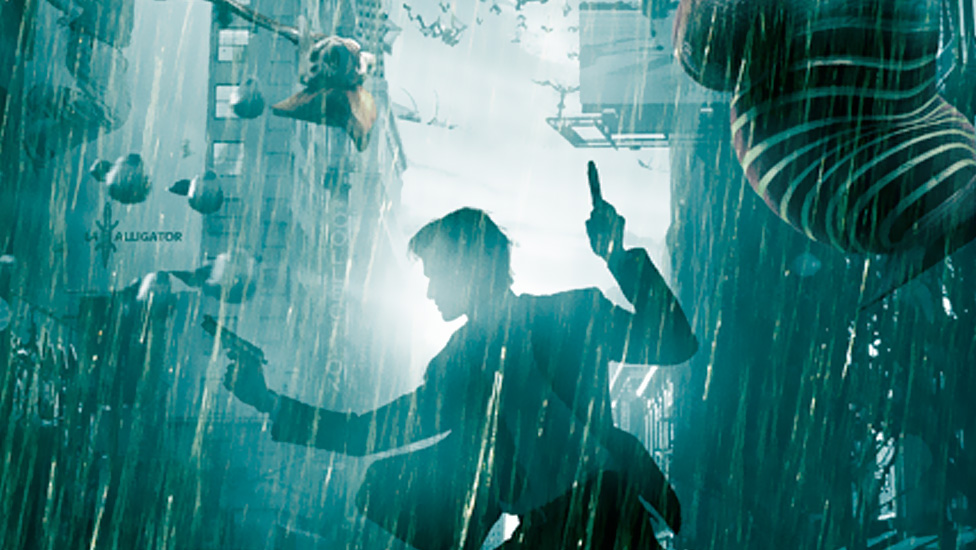Culture
“Branded” as a disaster

Branded
dir. Jamie Bradshaw and Aleksandr Dulerayn
Release Date: Sep 07, 12
- 1
- 2
- 3
- 4
- 5
- 6
- 7
- 8
- 9
- 10
As blatant mismarketing goes, Branded deserves some kind of award for how grossly misrepresentative its trailer is of the film as a whole. That’s ironic, considering that the seriously bizarre, largely incoherent story of Misha’s (Ed Stoppard) path to enlightenment begins with an award show. Living in Moscow, Misha has been a hired gun for a PR agency for years, perpetually under the thumb of Bob Gibbons (Jeffery Tambor), his boss and mentor. When Misha starts getting all sweaty and heavy-breathing with Bob’s niece Abby (Leelee Sobieski), Bob and Misha become estranged. This leads to some plot contrivances involving a heart attack and the comatose victim of a body-improvement reality show that serve to get us from the unbearably dull first half of Branded to the jaw-droppingly insane second half.
That’s not a compliment, mind you. The writer-director team behind Branded, Jamie Bradshaw and Aleksandr Dulerayn, show only a basic comprehension of how to build a story on film, from the mostly lifeless performances to a pervasive narrator that invades the early part of the film and then disappears right when a lot of things start to need some heavy-headed explanation. They’re clearly swinging for the fences here, starting off with a title crawl that implicitly compares their story to the works of Joan of Arc, Sigmund Freud and other idiosyncratic heroes of recent human history, through the argument that all of the above saw things that others couldn’t see and therefore changed history. Their central thesis is also on par with a teenager who’s just read 1984 for the first time, charged with the energy of dismantling social structures as a means of making things better because corporations are bad and they make everyone fat and complacent, okay? Because of this slavish devotion to misguided idealism, without much of an actual discernible purpose in place, Branded just feels like an extended rant.
However, I don’t want to focus on the amount of time the film wastes trying to make you care about Misha’s plight, or whether he and Abby will make it despite Misha’s distaste for Abby’s overweight son. Instead, I want to talk about the truly unhinged core of Branded, the point at which that same aggressive teenager perspective completely takes over the movie using only some remedial ideas about how to destroy the establishment and some laughably terrible CGI. Misha eventually ends up living in rural Russia for a time, and after an incident involving a red cow and some fever visions (easily the film’s most unintentionally uproarious sequence), he develops the ability to see through advertising’s veneers, to observe precisely how controlled the citizens of Moscow really are. And of course, Misha is the only one who can stop them, despite his spastic fits, constant twitching and penchant for throwing peoples’ food away wherever he goes.
Stoppard’s performance could have worked if only he’d gone a little bit farther over the top with it. Like the film as a whole, he could’ve benefitted from some high-level histrionics, but instead settles for utter banality even as the world around him goes mad. Where the film really gains steam is in its final act, when Misha finds a way to destroy the ties that bind all of Moscow to those dastardly fast food companies. If you’ve not seen any promotional material, far be it for me to spoil how literal that statement gets; suffice it to say that it involves brain cables, dragons, a virus and a riot that crassly traffics in murder and rape in order to push the film’s protagonist into full-blown martyrdom. Branded becomes a significantly worse film around this point, but at least it’s also a far more interesting one.
Watching the film’s grand finale, I was moved to recall AV Club writer Scott Tobias’ review of Skyline a few years ago, another awful film moved into the rarified air of beautiful failure by a psychotic ending. He spoke of how he would be the first in line for a sequel to that film that began exactly where the first film left off, and continued to escalate. If only Branded had begun in medias res, and committed to the madness that ultimately consumes it, there may have yet been hope. Instead, there is only the deafening silence of an utter failure, and the curious question of exactly how in the hell Max Von Sydow was convinced to play a Machiavelli for hire that can turn advertising pitches into sentient flesh balloons. And please, whatever you do, don’t take the phrase “sentient flesh balloons” as a reason to see Branded. You’ll be disappointed.